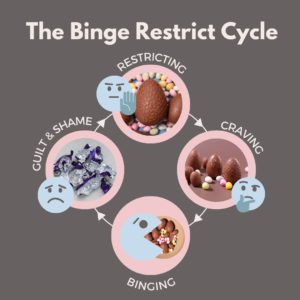How To Break The Binge-Restrict Cycle
‘I can’t stop overeating and I feel out of control around food’, unfortunately this is something we come across every day in our clinic. If this is you, you are not alone. And there are ways we can help support you in working through bingeing.
The hallmark of bingeing and restricting is that:
- You continue to binge no matter how much you promise yourself you will restrict
- You feel disgusted with your lack of control
- Feelings of shame, guilt, fear, and sadness arise
- You’re disgusted with your body and therefore restrict further in order to try to ‘lose weight’
- You may frequently body check, especially after a binge
So how do we break the vicious restrict binge cycle?
Firstly let’s start by explaining exactly what is going on.
The binge-restrict cycle is a pattern of eating triggered by food restriction. You may have seen our recent Easter post, which highlighted the 4 steps of the Binge-Restrict cycle:

- Restricting – this is when you withhold certain foods, food groups or maybe amounts of food. This may look different for different people. E.g. Maybe you are restricting chocolate because you are trying to reduce your sugar intake or maybe you are skipping breakfast to reduce your caloric intake.
- Craving – when you restrict food, your desire for that food increases, and all you can think about is that food
- Bingeing – having restricted that food, causing you craving for that food to increase, you start to feel out-of-control around that food, which results in you consuming large amounts in one sitting.
- Guilt & shame – are often felt following bingeing. Maybe you feel like you are defeated, or at-fault for eating too much – which inevitably brings you back to the restricting phase as a compensatory mechanism, thereby starting the cycle… all … over… again!
During certain holidays and festivals, this cycle may be exacerbated due to the abundance of different food groups available such as chocolate at easter, sweets and jellies at halloween or desserts at Christmas to name a few. However, there are many ways in which this appears for many people year-round. For example, restricting carbs, eating ‘clean’, having ‘cheat days’ and so on.
If you have identified with any of the above, you may be wondering how to stop the Binge-Restrict Cycle…
This part takes practice, and repetition, and can be broken down into 3 key steps.
- Giving yourself permission: the more you are exposed to something, the less your brain cares about it – this is known as food habituation. So, while restricting foods makes your brain fixate on them, the opposite is true when you give yourself permission to consume these foods. In allowing yourself to eat all foods, and exposing yourself to all foods, the less your brain thinks about them, and your desire for them diminishes.
- Reframing your thoughts: for this to be successful you must reframe how you think about certain foods. To neutralise your view of certain foods, instead of saying “I’m never allowed to eat pizza”, say, “I’m allowed to eat pizza when it sounds satisfying to me”. Avoid labelling foods as “good” or “bad” – remember food does not have a moral value.
- Avoid ‘saving up’: if you are not fuelling your body appropriately, in order to allow yourself a certain food at the end of the day, or at the weekend, or for a special occasion – this will only increase your likelihood of overeating whatever that food may be when it comes around.
We understand that this may seem daunting at first and so we recommend that you take baby-steps by:
- Identifying your food restrictions
- Start by picking one item on your “off-limits” food list and allow yourself to eat this food. You may find yourself wanting to eat it more often in the beginning, but after a while these foods you had once placed on a pedestal, will feel like all the other foods you keep in your house.
- Schedule a discovery call if you want to learn more, or need extra support!
Written by Lorna Haydon BSc (Hons) & Jess Willow RD, CIEC









